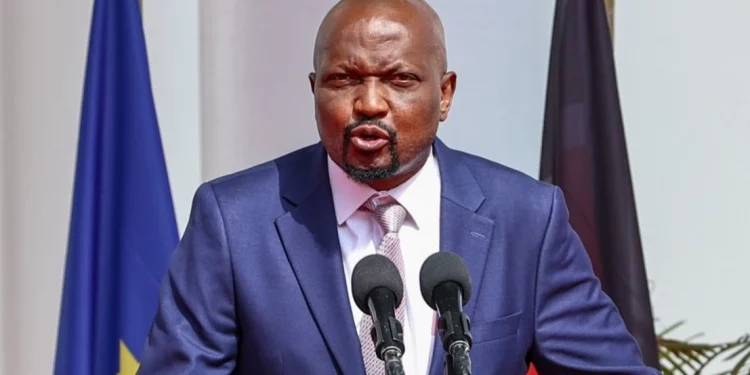Former Cabinet Secretary Moses Kuria has painted a stark picture of the challenges facing Kenya’s economy, particularly the Finance Ministry.
Kuria, who recently left his position in the government, highlighted the urgent need for increased revenue collection and significant adjustments to address the country’s mounting debt.
“John Mbadi [the new Finance Minister] is going to be confronted by four major risks,” Kuria said. “The most important one is of course this expenditure. It’s a must he must take the knife and cut government expenditure. He must do a microscopic review with some boldness.”
Kuria emphasized the critical role of the Kenya Revenue Authority (KRA) in addressing the country’s financial woes. “[KRA] must be reformed. We must tax bring more people in the tax bracket so that the few people who are paying taxes are able to observe some relief,” he stated.
The former Cabinet Secretary suggested that with proper reforms and automation, the KRA could potentially hit KES 5 trillion in revenue without adding new taxes. This increased revenue, he argued, could allow for reductions in value-added tax (VAT) rates.
Beyond domestic revenue collection, Kuria stressed the importance of managing relationships with international financial institutions and markets. He noted the recent downgrade by credit rating agencies and the postponement of an International Monetary Fund (IMF) review as significant challenges for the new Finance Minister.
“If IMF doesn’t come through end of this month, in another 19 days, this shilling might hit 170 to the dollar,” Kuria warned, underscoring the urgency of the situation.
The interview also touched on broader political and governance issues. Kuria revealed his plans to push for constitutional reforms, which he believes are necessary to address fundamental structural problems in Kenya’s governance system.
“We cannot keep on taking Panadol instead of surgery. We cannot keep doing patchwork instead of buying a new car,” Kuria metaphorically explained. He indicated his intention to start a popular initiative for constitutional reform, stating he had already consulted with opposition leader Raila Odinga and plans to speak with President William Ruto on the matter.
Regarding the current political arrangement that brought opposition figures into government, Kuria claimed credit for suggesting the idea to President Ruto. However, he expressed doubts about its longevity, predicting that opposition members might leave the government before the 2027 elections to prepare for their campaigns.
Reflecting on his time in office, Kuria maintained he had no regrets and defended his performance. He highlighted his efforts to reform the Kenya School of Government and his plans to convert it into an African School of Government within the next three years.
Looking ahead, Kuria shared his plans to write a book about his experiences in government, due to be launched in December. He also expressed his intention to speak on global issues such as climate change and the reform of international financial institutions.
The interview provided insights into cabinet dynamics and the challenges facing various ministries. Kuria offered his perspective on the relationship between President Ruto and Deputy President Rigathi Gachagua, suggesting there were occasional differences of opinion.
“The relationship between the President and the Deputy President is not as smooth as it appears. There are fundamental differences in how they approach governance, and these differences could become more pronounced as we move forward,” Kuria noted, leaving room for speculation about potential rifts at the highest levels of government.
Throughout the interview, Kuria emphasized the need for patience and unity among Kenyans. “Let’s keep the hope, please,” he urged. “It is so easy to destroy, it is so difficult to build. Please let us be patient.”












